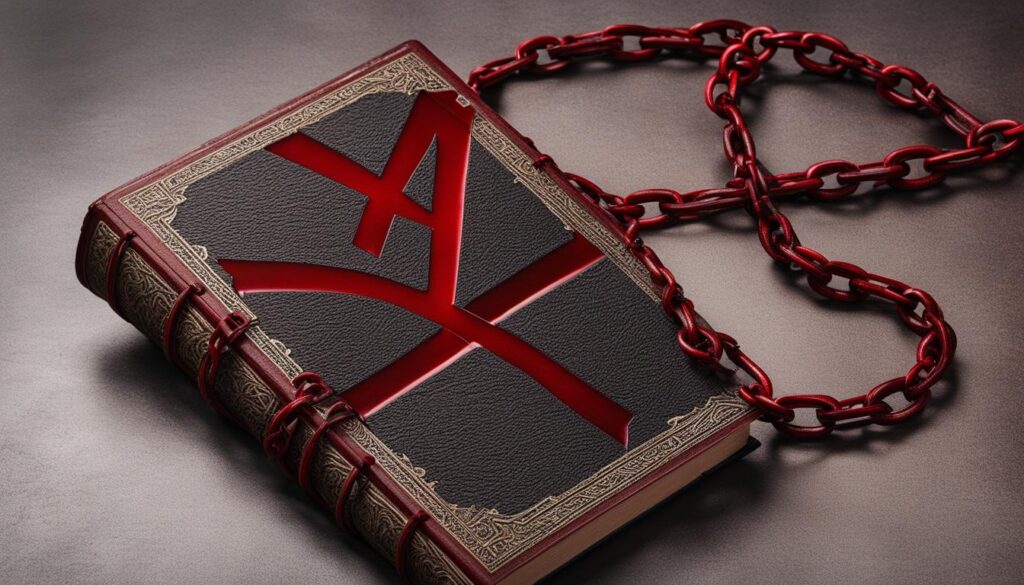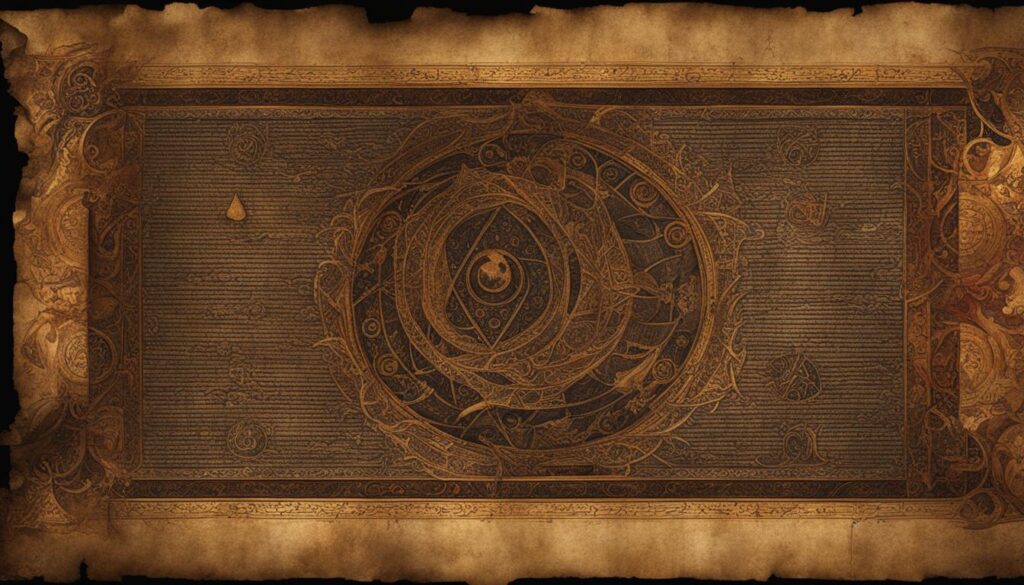As theologians and copywriting journalists, we often encounter queries about the legitimacy of scriptural texts, specifically the ancient Book of Enoch. Many readers would like to know if it is safe to read the book, given its absence from the biblical canon. In this section, we will explore the reasons why it is advisable to stay away from the Book of Enoch, despite the many fascinating stories contained within its pages.
The Book of Enoch is an ancient text that describes Enoch as a prophet, including stories about fallen angels, human women, and the Nephilim, among other topics. However, it is important to note that the Book of Enoch is not included in the biblical canon. In this section, we will delve into its status in biblical studies, its content, and its implications for faith.
Key Takeaways:
- The Book of Enoch is not a part of the official biblical canon
- The Book of Enoch describes stories of fallen angels, human women, and the Nephilim
- Reading the Book of Enoch may have implications for one’s understanding of biblical events and teachings
- Staying focused on the Bible is important for Christians
- When deciding to read the Book of Enoch, it is essential to exercise caution and discernment
The Book of Enoch’s Status in the Biblical Canon
When considering the Book of Enoch, it is essential to note that it is not part of the biblical canon. While Enoch is an ancient patriarch mentioned in the Bible, the book attributed to him is not considered as part of the inspired Scriptures. Even though the book is referenced in the Book of Jude, it is not included in the official biblical canon.
It is important to stay aware of this fact when reading the book. While some may find value in engaging with it, the book’s status within the canon cannot be overlooked. Despite its exclusion from the biblical text, the Book of Enoch offers unique insights into ancient traditions and beliefs that shaped many religious and cultural traditions.

The Content of the Book of Enoch
The Book of Enoch is a collection of stories and teachings that offer a unique perspective on biblical events and beliefs. It contains detailed accounts of heavenly beings and their interactions with humans, including fallen angels and the origins of the nephilim. The book also includes prophetic visions and insights into the life of Enoch himself, the great-grandfather of Noah and father of Methuselah, who “walked with God” and was taken away by God (Genesis 5:24).
One of the most significant sections of the Book of Enoch is the Book of Watchers, which describes fallen angels who descended to Earth and had offspring with human women. This concept differs from the biblical narrative, where angels are not capable of reproduction. The book also includes a prophetic vision of the Flood and the ark of Noah.
Some believe that the Book of Enoch contains valuable insights into the events and teachings of the Bible. However, it is critical to approach the book with caution and discernment, recognizing that it is not considered part of the biblical canon. This text is essential to keep the focus on the Bible as the primary source of divine revelation and to ensure that the teachings of salvation through Jesus Christ remain central to one’s faith.
Reasons Why Many Christians Reject the Book of Enoch
Many Christians reject the Book of Enoch for various reasons. One major factor is that it was removed from the Bible due to concerns about its accuracy and authenticity. Due to its absence from the biblical canon, some believe that the book is not divinely inspired and should not be considered Scripture.
The book’s depiction of the “sons of God” and their relationships with human women differs from the biblical narrative, leading some to question its legitimacy. While scholars recognize the book’s historical value, many Christians believe that it should not be considered part of the sacred text.

“Traditionally, the Book of Enoch has been excluded from the Bible, and there are good reasons for that. The book offers insights into ancient Jewish beliefs, but it carries some significant theological implications that conflict with mainstream Christian doctrines.”
The Book of Enoch and the Bible’s Teachings
We want to emphasize that the Book of Enoch is not considered part of the Bible’s teachings. While some similarities exist between the book and the Bible, it’s important to understand the key difference: the Book of Enoch is not included in the biblical canon. Therefore, Christians who rely solely on the Bible as the source of their faith may consider the Book of Enoch extraneous to their beliefs.
It’s crucial to be aware of the Book of Enoch’s status and significance when it comes to approaching it as a spiritual text. Christians who use the Bible alone and base their faith on its teachings may not find value in reading the Book of Enoch. Especially considering the fact that it’s not part of the official biblical canon.

The Bible vs. The Book of Enoch
| Bible | Book of Enoch |
|---|---|
| Considered the inspired word of God | Not considered part of the official biblical canon |
| Composed over several centuries | Composed in the 3rd century BCE or later |
| Includes 66 books | Includes 5 books (the Book of Watchers, Parables, Similitudes, Dreams, and Epistle of Enoch) |
| Emphasizes salvation through faith in Jesus Christ | Contains additional accounts of supernatural events and figures |
As the table shows, the difference between the Bible and the Book of Enoch is significant. Christians should consider this difference before deciding whether or not to read it and whether it has any value for their spiritual beliefs.
The Book of Enoch’s Influence and Historical Context
The Book of Enoch is an ancient text that continues to have significant influence on religious and cultural traditions. Scholars believe that the book was written during the Second Temple period, between the 3rd century BCE to the 1st century CE. The book offers unique insights into ancient traditions and beliefs, which has led to its continued relevance in modern scholarship.
Although the Book of Enoch has had a significant impact on religion and culture, it is important to note that the book is not considered part of the biblical canon. Despite being quoted in the book of Jude and mentioned in other parts of the Bible, the book attributed to Enoch is not included as part of the biblical text. Early Christian communities rejected the inclusion of the book in the Bible’s canon for various reasons.

The influence of the Book of Enoch can be seen in various religious and cultural traditions. For instance, the book’s teachings on fallen angels and the nephilim have had an impact on Jewish, Christian, and Islamic beliefs regarding these supernatural beings. Additionally, the Book of Enoch’s depiction of angels has been influential in art, literature, and popular culture.
However, it is important to approach the Book of Enoch with caution and discernment, recognizing its status outside of the biblical canon. Although the book may offer unique insights, it should not be considered equal to the inspired Scriptures found in the Bible. Ultimately, Christians should stay focused on the teachings of the Bible and the message of salvation through Jesus Christ.
Staying Focused on the Bible
As we’ve discussed, the Book of Enoch is not considered part of the biblical canon for various reasons. Therefore, as Christians, we are urged to stay focused on the Bible as the primary source of divine revelation. It is important to be aware of the reasons why the Book of Enoch is not included in the biblical canon and to exercise caution when considering additional texts for spiritual guidance.
By staying away from the Book of Enoch, we can ensure that we are following the teachings of the Bible and not straying into extraneous beliefs and practices. We should keep our faith grounded in the teachings of the Bible alone, as it is the most authoritative source of scripture.
Furthermore, staying focused on the Bible is not only beneficial for our faith but also helps us avoid confusion and potential misinterpretation of biblical doctrine. Reading the Book of Enoch or any other non-canonical texts runs the risk of leading us astray from the teachings of the Bible and can blur the lines between biblical truth and personal opinion.
Therefore, we must be aware of the reasons why the Book of Enoch is not part of the biblical canon and exercise caution when considering additional texts for spiritual guidance. By doing so, we can ensure that our faith remains grounded in the teachings of the Bible and that we stay true to our Christian beliefs and principles.
Important Considerations when Deciding to Read the Book of Enoch
While the decision to read any book is a personal choice, it is essential to be aware of the Book of Enoch’s status and significance. We understand that you may have heard about the book and want to explore it further, but Encoh is a matter of personal discernment.
It is important to note that the Book of Enoch is not part of the biblical canon, and its contents differ significantly from the canonical books recognized by mainstream Christian traditions. The key difference is that the book is not included in the biblical text. Therefore, it is essential to distinguish between the two.
“It should be noted that even if one is willing to read the Book of Enoch, it is not part of the inspired Scriptures. It should be read as one of many ancient texts and not taken as a divinely inspired document.”
Given these differences, it is important to exercise caution and discernment when engaging with the book’s contents. We urge you to stay informed and consider the potential implications of reading the text.
Implications of Engaging with the Book of Enoch
When delving into the Book of Enoch, readers may come across various events found in the book that offer unique perspectives on biblical teachings. However, readers must exercise caution and discernment while engaging with non-canonical texts, such as the Book of Enoch, to avoid straying from the core principles of salvation through Jesus Christ and the teachings of the Bible.
It is important to acknowledge that the Book of Enoch is not part of the biblical canon and is not considered to be inspired by God. However, it still offers some valuable insights into ancient beliefs and traditions.
In the Book of Enoch, there are various teachings that are not included in the Bible, which may lead to a different understanding of biblical events. However, while engaging with the book, caution must be taken to ensure that any teachings align with the principles laid out in the Bible, particularly regarding salvation through Jesus Christ.
We encourage readers to remember that while the Book of Enoch may offer unique perspectives on biblical events, it is important to remain focused on the teachings of the Bible and the principles of salvation through Jesus Christ.
Conclusion
In conclusion, we recommend exercising caution when considering whether or not to read the Book of Enoch. While it may offer unique insights into ancient traditions and beliefs, it is not part of the biblical canon for various reasons. As Christians, we urge you to stay focused on the Bible as the primary source of divine revelation and spiritual guidance.
It is important to be aware of the reasons why the Book of Enoch is not included in the Bible and to exercise discernment when engaging with other texts. While the decision to read the Book of Enoch is a matter of personal conviction and discernment, we remind you to prioritize the core principles of salvation through Jesus Christ and the teachings of the Bible in your spiritual journey.
By staying grounded in the Bible and being aware of the implications of engaging with other texts, we can deepen our understanding of God’s word and grow in our faith.





